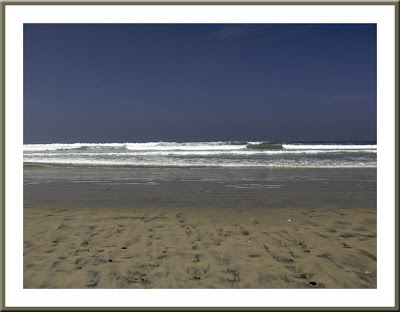 My soul is dancing.
My soul is dancing.My feet are still and silent.
My heart sings softly.




 Caesar Chavez, a painting by Pozos
Caesar Chavez, a painting by Pozos TOMORROW, MARCH 31, IS CAESAR CHAVEZ DAY in California, and I'm psyched for it. At the annual Caesar Chavez Breakfast at San Diego Convention Center this morning, I heard a young woman from Holtville High School read her essay that won an $8,000 scholarship. She quoted Chavez several times. She reminded us that he said, "Only by giving our lives, do we find life." Her essay also reminded me of another saying that I believe also came from Caesar Chavez. "My life is really the only thing that belongs to me." Maria Reyna's essay made me remember why I liked working with high school students. It was all about hope for herself and for her generation, and indeed for all of us. Caesar Chavez, who didn't get as far as high school in his own formal education, was an advocate for education for all people.
TOMORROW, MARCH 31, IS CAESAR CHAVEZ DAY in California, and I'm psyched for it. At the annual Caesar Chavez Breakfast at San Diego Convention Center this morning, I heard a young woman from Holtville High School read her essay that won an $8,000 scholarship. She quoted Chavez several times. She reminded us that he said, "Only by giving our lives, do we find life." Her essay also reminded me of another saying that I believe also came from Caesar Chavez. "My life is really the only thing that belongs to me." Maria Reyna's essay made me remember why I liked working with high school students. It was all about hope for herself and for her generation, and indeed for all of us. Caesar Chavez, who didn't get as far as high school in his own formal education, was an advocate for education for all people. 



 Van Hanh Buddhist Temple; chùa Vạn-hạnh
Van Hanh Buddhist Temple; chùa Vạn-hạnh I got carried away with Photoshop and couldn't stop myself until I had done some interesting things with Spanish Village in Balboa Park.
I got carried away with Photoshop and couldn't stop myself until I had done some interesting things with Spanish Village in Balboa Park. JAZZ ON THE EDGE
JAZZ ON THE EDGE


 WHAT'S IN A NAME
WHAT'S IN A NAME
 I live in the condominium community on the hill across the valley. The bridge and the wooded area by the river below our place is home to dozens of people, some of them children. I hope I never forget they are there and that I have responsibility to do everything I can to get them back in homes. One of the things I am proud to say I did was to vote for the good man who is now president of my country. In his news conference tonight he said, and I quote, "It breaks my heart that any children in our country are homeless." He pledged to continue to work to get their parents back to work and the families back in homes. The historic gates at the north end of Park Boulevard will serve to remind me that the good life is closed off to far too many people.
I live in the condominium community on the hill across the valley. The bridge and the wooded area by the river below our place is home to dozens of people, some of them children. I hope I never forget they are there and that I have responsibility to do everything I can to get them back in homes. One of the things I am proud to say I did was to vote for the good man who is now president of my country. In his news conference tonight he said, and I quote, "It breaks my heart that any children in our country are homeless." He pledged to continue to work to get their parents back to work and the families back in homes. The historic gates at the north end of Park Boulevard will serve to remind me that the good life is closed off to far too many people.
 SURF AFTER A SMALL STORM
SURF AFTER A SMALL STORM  THE CATERPILLAR
THE CATERPILLAR
 MORAL ARMY?
MORAL ARMY?



 EUCALYPTUS
EUCALYPTUS



